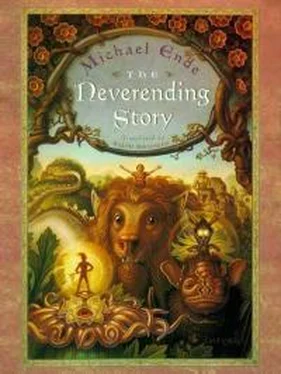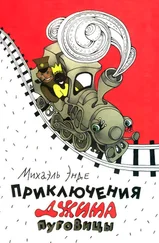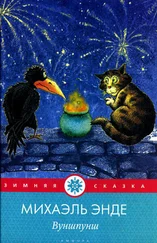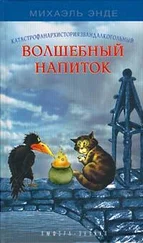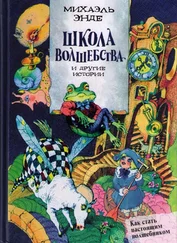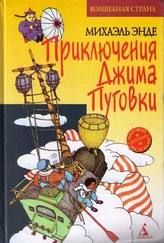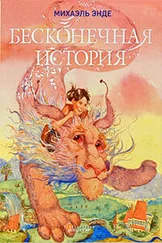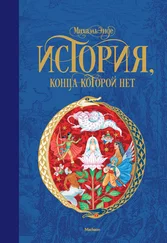“Hoo, it’s a will-o’-the-wisp,” whispered the night-hob, and his moon eyes glowed. “Pleased to meet you!”
The tiny stood up, took a few steps toward the newcomer, and chirped: “If my eyes don’t deceive me, you are here as a messenger.”
“Yes indeed,” said the will-o’-the-wisp.
The tiny removed his red top hat, made a slight bow, and twittered: “Oh, do join us. We, too, are messengers. Won’t you be seated?”
And with his hat he motioned toward an empty place by the fire.
“Many thanks,” said the will-o’-the-wisp, coming timidly closer.
“Allow me to introduce myself. My name is Blubb.”
“Delighted,” said the tiny. “Mine is Gluckuk.”
The night-hob bowed without getting up. “My name is Vooshvazool.”
“And mine,” the rock chewer crackled, “is Pyornkrachzark.”
All three looked at the will-o’-the-wisp, who was wriggling with embarrassment.
Will-o’-the-wisps find it most unpleasant to be looked full in the face.
“Won’t you sit down, dear Blubb?” said the tiny.
“To tell the truth,” said the will-o’-the-wisp, “I’m in a terrible hurry. I only wanted to ask if by any chance you knew the way to the Ivory Tower.”
“Hoo,” said the night-hob. “Could you be going to see the Childlike Empress?”
“Exactly,” said the will-o’-the-wisp. “I have an important message for her.”
“What does it say?” the rock chewer crackled.
“But you see,” said the will-o’-the-wisp, shifting its weight from foot to foot, “it’s a secret message.”
“All three of us—hoo—have the same mission as you,” replied Vooshvazool, the night-hob. “That makes us partners.”
“Maybe we even have the same message,” said Gluckuk, the tiny.
“Sit down and tell us,” Pyornkrachzark crackled.
The will-o’-the-wisp sat down in the empty place.
“My home,” it began after a moment’s hesitation, “is a long way from here. I don’t know if any of those present has heard of it. It’s called Moldymoor.”
“Hoo!” cried the night-hob delightedly. “A lovely country!”
The will-o’-the-wisp smiled faintly.
“Yes, isn’t it?”
“Is that all you have to say, Blubb?” Pyornkrachzark crackled. “What is the purpose of your trip?”
“Something has happened in Moldymoor,” said the will-o’-the-wisp haltingly, “something impossible to understand. Actually, it’s still happening. It’s hard to describe—the way it began was—well, in the east of our country there’s a lake—that is, there was a lake—Lake Foamingbroth we called it. Well, the way it began was like this. One day Lake Foamingbroth wasn’t there anymore—it was gone. See?”
“You mean it dried up?” Gluckuk inquired.
“No,” said the will-o’-the-wisp. “Then there’d be a dried-up lake. But there isn’t.
Where the lake used to be there’s nothing—absolutely nothing. Now do you see?”
“A hole?” the rock chewer grunted.
“No, not a hole,” said the will-o’-the-wisp despairingly. “A hole, after all, is something. This is nothing at all.”
The three other messengers exchanged glances.
“What—hoo—does this nothing look like?” asked the night-hob.
“That’s just what’s so hard to describe,” said the will-o’-the-wisp unhappily. “It doesn’t look like anything. It’s—it’s like—oh, there’s no word for it.”
“Maybe,” the tiny suggested, “when you look at the place, it’s as if you were blind.”
The will-o’-the-wisp stared openmouthed.
“Exactly!” it cried. “But where—I mean how—I mean, have you had the same. ..?”
“Wait a minute,” the rock chewer crackled. “Was it only this one place?”
“At first, yes,” the will-o’-the-wisp explained. “That is, the place got bigger little by little. And then all of a sudden Foggle, the father of the frogs, who lived in Lake Foamingbroth with his family, was gone too. Some of the inhabitants started running away. But little by little the same thing happened to other parts of Moldymoor. It usually started with just a little chunk, no bigger than a partridge egg. But then these chunks got bigger and bigger. If somebody put his foot into one of them by mistake, the foot—or hand—or whatever else he put in—would be gone too. It didn’t hurt—it was just that a part of whoever it was would be missing. Some would even fall in on purpose if they got too close to the Nothing. It has an irresistible attraction—the bigger the place, the stronger the pull. None of us could imagine what this terrible thing might be, what caused it, and what we could do about it. And seeing that it didn’t go away by itself but kept spreading, we finally decided to send a messenger to the Childlike Empress to ask her for advice and help. Well, I’m the messenger.”
The three others gazed silently into space.
After a while, the night-hob sighed: “Hoo! It’s the same where I come from. And I’m traveling on the exact same errand—hoo hoo!”
The tiny turned to the will-o’-the-wisp. “Each one of us,” he chirped, “comes from a different province of Fantastica. We’ve met here entirely by chance. But each one of us is going to the Childlike Empress with the same message.”
“And the message,” grated the rock chewer, “is that all Fantastica is in danger.”
The will-o’-the-wisp cast a terrified look at each one in turn.
“If that’s the case,” it cried, jumping up, “we haven’t a moment to lose.”
“We were just going to start,” said the tiny. “We only stopped to rest because it’s so awfully dark here in Howling Forest. But now that you’ve joined us, Blubb, you can light the way.”
“Impossible,” said the will-o’-the-wisp. “Would you expect me to wait for someone who rides a snail? Sorry.”
“But it’s a racing snail,” said the tiny, somewhat miffed.
“Otherwise—hoo hoo—” the night-hob sighed, “we won’t tell you which way to go.”
“Who are you people talking to?” the rock chewer crackled.
And sure enough, the will-o’-the-wisp hadn’t even heard the other messengers’ last words, for it was already flitting through the forest in long leaps.
“Oh well,” said the tiny, pushing his top hat onto the back of his head, “maybe it wouldn’t have been such a good idea to follow a will-o’-the-wisp.”
“To tell the truth,” said the night-hob, “I prefer to travel on my own. Because I, for one, fly.”
With a quick “hoo hoo” he ordered his bat to make ready. And whish! Away he flew.
The rock chewer put out the campfire with the palm of his hand.
“I, too, prefer to go by myself,” he crackled in the darkness. “Then I don’t need to worry about squashing some wee creature.”
Rattling and grinding, he rode his stone bicycle straight into the woods, now and then thudding into a tree giant. Slowly the clatter receded in the distance.
Gluckuk, the tiny, was last to set out. He seized the silvery reins and said: “All right, we’ll see who gets there first. Geeyap, old-timer, geeyap.” And he clicked his tongue.
And then there was nothing to be heard but the storm wind howling in the treetops.
The clock in the belfry struck nine. Reluctantly Bastian’s thought turned back to reality. He was glad the Neverending Story had nothing to do with that.
He didn’t like books in which dull, cranky writers describe humdrum events in the very humdrum lives of humdrum people. Reality gave him enough of that kind of thing, why should he read about it? Besides, he couldn’t stand it when a writer tried to convince him of something. And these humdrum books, it seemed to him, were always trying to do just that.
Читать дальше
